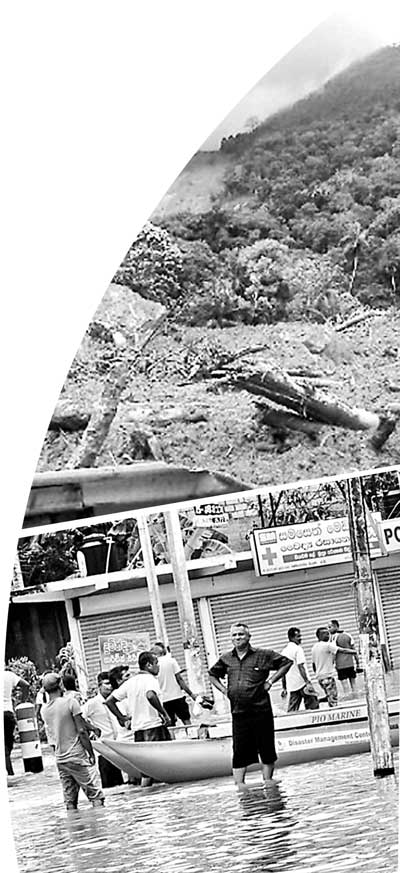Reply To:
Name - Reply Comment
Last Updated : 2024-04-25 22:12:00
Thousands of people who are displaced by floods and landslides are in need of urgent relief by way of food, clothing, shelter and medicine. They cannot worry about the long term impact of the disaster. Nor can they worry about what is actually behind the unprecedented calamity. So, what is urgent is to get the necessary relief to people who are suffering. So, we should do everything to meet their basic needs, while planning the next steps to resettle them in their habitats in the best
possible manner.

 On the other hand, as a country, we cannot shirk our responsibly to look at the larger picture with a view to understanding both the background to the present crisis and how we could possibly get out of the present environmental mess. While some might be inclined to think that mass displacement of people is simply a matter of just another bad natural disaster, a more careful analysis of the disaster and its adverse impacts would point to a complex picture with respect to the causes and consequences of the extreme weather events that we have witnessed over the last week or so. Though such an analysis, in the short run, may not help the thousands of hapless people affected by the floods and landslides, State institutions entrusted with the responsibility of managing natural resources such as land and water and the built environment can benefit a great deal from a deeper understanding of the diverse circumstances that contribute to natural disasters and their devastating consequences.
On the other hand, as a country, we cannot shirk our responsibly to look at the larger picture with a view to understanding both the background to the present crisis and how we could possibly get out of the present environmental mess. While some might be inclined to think that mass displacement of people is simply a matter of just another bad natural disaster, a more careful analysis of the disaster and its adverse impacts would point to a complex picture with respect to the causes and consequences of the extreme weather events that we have witnessed over the last week or so. Though such an analysis, in the short run, may not help the thousands of hapless people affected by the floods and landslides, State institutions entrusted with the responsibility of managing natural resources such as land and water and the built environment can benefit a great deal from a deeper understanding of the diverse circumstances that contribute to natural disasters and their devastating consequences.
As is widely known today, extreme weather events have become more common in recent times,  undoubtedly due to global-warming-related climate change. This is a massive challenge to humanity and the response needed has to be mounted by the global community as a whole. A small country like Sri Lanka has a responsibility to do whatever it can to contribute to the global effort to arrest the current trend but the impact of even the best efforts of Sri Lanka is unlikely to be very significant. This does not however mean that we should not partner with the international community to augment the global response. What is equally or more important for the country is to identify the policy measures that we can take to reduce disaster risks that an increasing proportion of people face today. In fact, the people in the country should hold Governments, State institutions and other stakeholders such as private businesses and professional groups accountable for avoidable disaster risks.
undoubtedly due to global-warming-related climate change. This is a massive challenge to humanity and the response needed has to be mounted by the global community as a whole. A small country like Sri Lanka has a responsibility to do whatever it can to contribute to the global effort to arrest the current trend but the impact of even the best efforts of Sri Lanka is unlikely to be very significant. This does not however mean that we should not partner with the international community to augment the global response. What is equally or more important for the country is to identify the policy measures that we can take to reduce disaster risks that an increasing proportion of people face today. In fact, the people in the country should hold Governments, State institutions and other stakeholders such as private businesses and professional groups accountable for avoidable disaster risks.
An in-depth analysis of past state policies, and the lapses in the imposition of rules and regulations would reveal that the vulnerabilities of large sections of the population today can be at least partly attributed to such policies and lapses.
For instance, regularisation of encroachments in highly vulnerable zones, such as low lying areas and steep mountain slopes exposed to heavy rainfall due to political pressure has resulted in the proliferation of dense human settlements there. It is people who were so settled in the recent past who are exposed to devastating floods and landslides today.
Extensive use of natural resources for cultivation and settlement purposes in such areas have disrupted natural defences against disasters, Eg, blocking of waterways, drainage lines, and vegetation make the situation even worse. Video clips shown on television these days clearly show the ground conditions in the affected areas where land is subdivided into minute parcels for building purposes leaving absolutely no space for the above purposes. Let alone squatters, even high-flown land developers these days do not leave any space for community purposes.
Sri Lanka is not known for careful settlement planning. Even in Colombo, there is hardly any systematic settlement planning. Councils have progressively reduced the land plot size and the same trend has prevailed in other cities and towns.
In rural areas, there has been hardly any building regulation. People have built whatever structures anywhere at will. Some of the structures so built have been highly vulnerable. Even politicians have built all kinds of edifices on environmentally sensitive hilly areas exposing village settlements in the vicinity to disaster risks. In all these cases, no careful risk assessments are done. On the other hand, if human settlements are carefully planned in terms of location, housing types, common amenities, infrastructure, open spaces, etc. , most of the vulnerabilities could be avoided. This of course is too much to ask for from populist politicians.
What is described above has been going on for many decades in the country. In fact, many human habitats in different parts of the country today are vulnerable to natural disasters. They cannot be easily relocated to ensure their safety.
While it is necessary to relocate at least those that are extremely vulnerable, I.e. settlements in low lying areas, identified landslide zones, canal and river banks, other settlements can be systematically evaluated with a view to identifying measures needed to reduce their vulnerability. On the other hand, at least from now on, we need to take settlement planning more seriously. This is all the more important in view of the increasing probability of extreme weather events everywhere. We may need to enact new legislation to hold Governments, Public Officials, Private Investors, Local Councils and Professionals accountable for their actions and inactions.
Stringent rules and regulations, if carefully formulated and followed, may help reduce avoidable disaster risks for vulnerable people.
As is well known, those who are exposed to floods and landslides, if fortunate enough to survive, often have to start from scratch. This is certainly not a good prospect for people who are already poor and socially and economically vulnerable. So, it is the responsibility of the State and other stakeholders to go beyond immediate relief efforts and develop long-term strategies to reduce exposure and vulnerability of large sections of the population to natural disasters like devastating floods and landslides. Population growth, land-lessness and inadequate investments in housing and human settlements over the years have forced more and more people into environmentally volatile areas.
Given the current fiscal crisis in the country, the government is unlikely to identify relocation of vulnerable settlements which is unlikely to be a priority area of public investment. Yet, this should not prevent the Government from adopting sound resettlement policies, enacting enabling legislation and facilitating the development of more secure human settlements in all parts of the country. The key objective of all these efforts should be to reduce exposure and vulnerability of people to natural disasters.

Add comment
Comments will be edited (grammar, spelling and slang) and authorized at the discretion of Daily Mirror online. The website also has the right not to publish selected comments.
Reply To:
Name - Reply Comment
US authorities are currently reviewing the manifest of every cargo aboard MV
On March 26, a couple arriving from Thailand was arrested with 88 live animal
According to villagers from Naula-Moragolla out of 105 families 80 can afford
Is the situation in Sri Lanka so grim that locals harbour hope that they coul